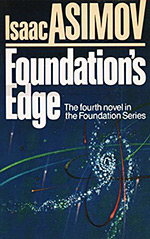
![]() verkisto
verkisto
7/26/2016
![]()
I realized while reading this novel that a lot of golden age science fiction shows a future that's fully enmeshed in the culture of its time. The Foundation series so far was written and published in the 1940s and '50s, and there are a handful of anachronisms, like the futuristic typewriter in Second Foundation (why are people still using paper at all, 10,000 years in the future?). It's interesting to see those sorts of things, since our interpretation of the future is based on what we're familiar with at the time. It's not even limited to golden age fiction, either; Doomsday Book by Connie Willis, published in 1992 and set in the late 21st Century, has a subplot centered on no one being able to reach anyone else because phone lines are down.
Foundation's Edge was written and published in the early 1980s, and catches up with what one would expect a futuristic society to be like. It still has its fair share of oddities (for a galactic society to still have backwoods worlds where people are fairly ignorant of space travel seems strange to me), but it was an improvement. It still didn't improve in its portrayal of the women characters, which was a further disappointment. It was easier to dismiss judgment on that portrayal with the original trilogy, due to it being a product of its time, but Foundation's Edge was written later, and still reflects that kind of thing. When a seasoned space traveler, who has been working under a female supervisor for years without any issues with her being a woman in power (he has issues with her, but for reasons that make sense), suddenly gets insulted by a planetary representative being a girl (not a woman, mind you, but "a girl"), the result isn't just insulting, it doesn't even make much sense. So even 10,000 years in the future, there's rampant sexism and misogyny going on. Wonderful.
I expect monumental science fiction novels to be more progressive than that. Maybe that's my own fault, but I expect people who make a living at envisioning a future society should at least be able to envision more equality among diverse groups of people. How can you create technologies that expand people's ability to reach distant stars and then not create a future where the people living together are treated equally?
Like the previous novels, Foundation's Edge is a story that winds up being a better idea than a novel. It tends to plod along for most of the novel, setting up the second half, which I will admit picks up and gets a little more unputdownable. But also like the previous novels, the key plot twist to the story is the idea that what we've been witnessing up until that point has been people acting under the unseen directives of other people. The Foundation controlled everything up until the Mule's intervention, and then the Mule controlled everything. Later, the Second Foundation controlled everything, but now we have yet another shadow group manipulating the direction of the galaxy? When does it end? And why does the entire series set itself thematically in a world where free will doesn't exist?
I'm not going to lie to you -- it's tempting to quit the entire series right here. I can't see that my issues with the series will go away with the next three novels, and considering the other books I have waiting for me to read them, it's hard to justify going through three more books, each longer than the last, that are going to be more of the same. I'm willing to give Foundation and Earth a chance, but if I don't see any appreciable improvements, I doubt I'll move on to the prequels. It just seems like it would be a waste of time.